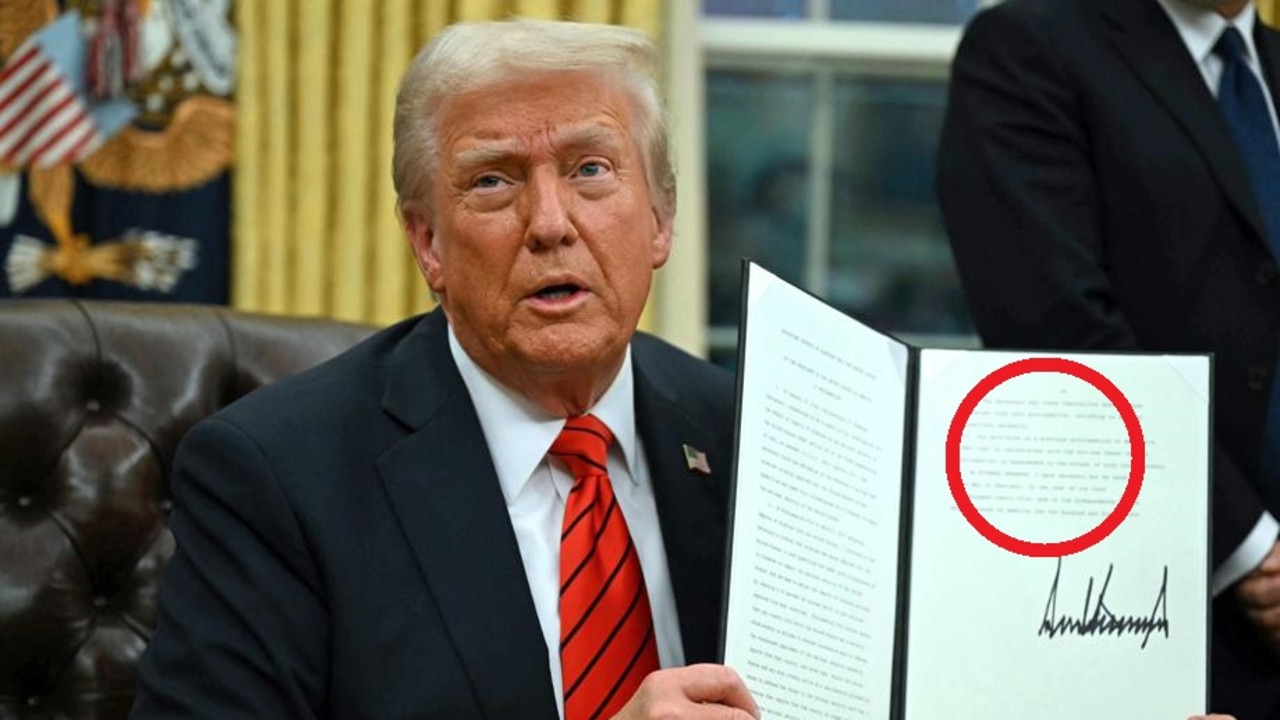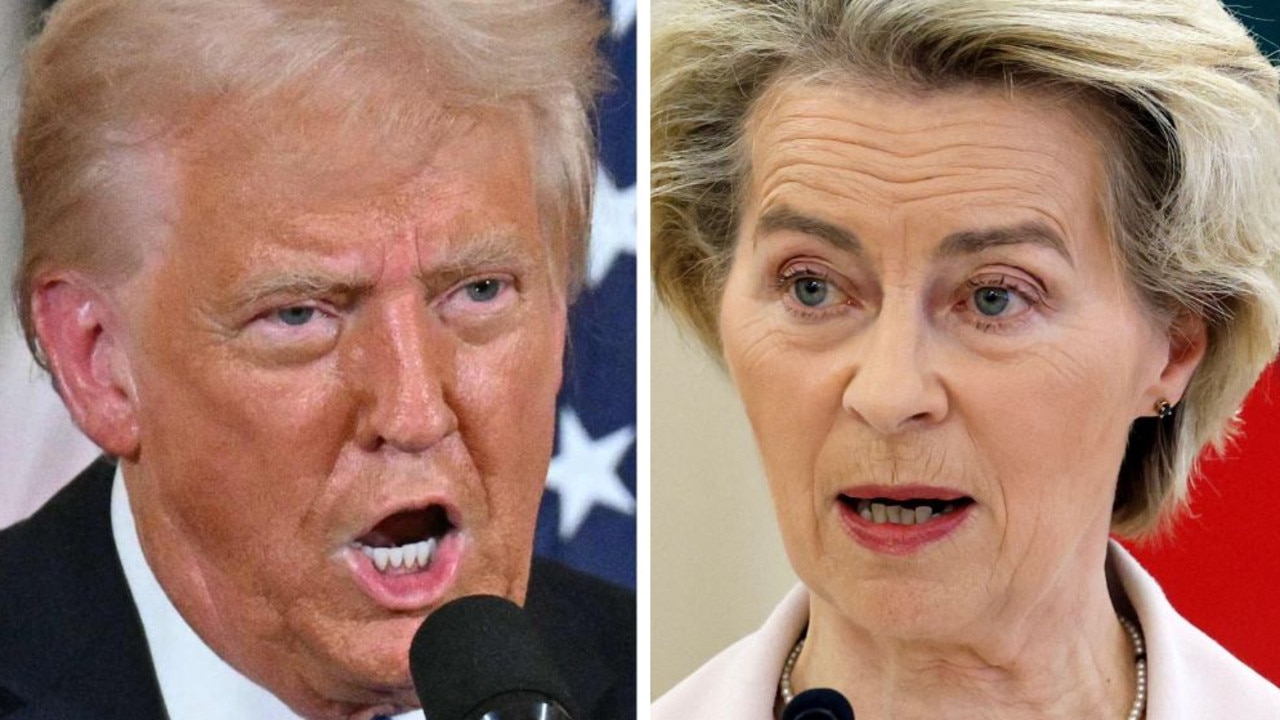Newborn pulled from Syria earthquake rubble adopted by aunt and uncle
A newborn baby girl pulled out alive from underneath rubble in quake-stricken Syria has left hospital and gone to a new home. See pictures.
World
Don't miss out on the headlines from World. Followed categories will be added to My News.
A baby girl born underneath rubble in Syria after a devastating earthquake killed her entire family has found a new home and been named to honour her late mother.
Extended family members discovered the newborn still attached to her deceased mother by the umbilical cord in the Syrian town of Jinayris following the massive 7.8-magnitude earthquake.
Dramatic footage of Afraa’s rescue shared on social media showed a man running away from the rubble with the dust-covered baby.
The newborn had reportedly been trapped under the collapsed building for over 10 hours and arrived at the hospital with bruises and cuts all over her body.
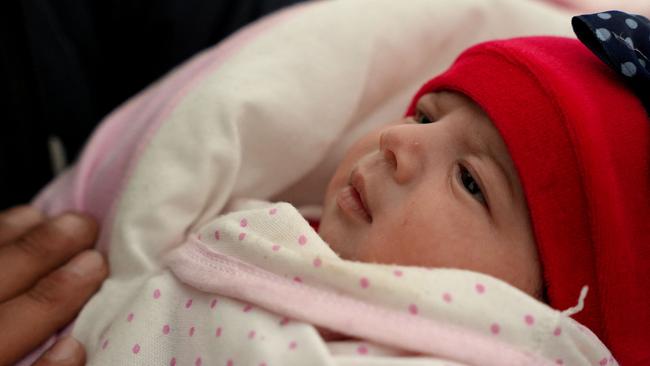
Afraa’s miraculous story was told globally — causing concern for her extended family as some people showed up at the hospital claiming they were related to her even though they had different family names.
But on Saturday, the newborn was discharged from the hospital after a DNA test confirmed her aunt was a blood relative.
Her aunt and uncle gave her the name Afraa, after her late mother. When she first arrived at the hospital, the staff there named her Aya — meaning “a sign from God” in Arabic.
“She is my soul, my life, and my whole world,” her uncle Khalil al-Suwadi told AFP from his tent in the town, cradling the newborn.
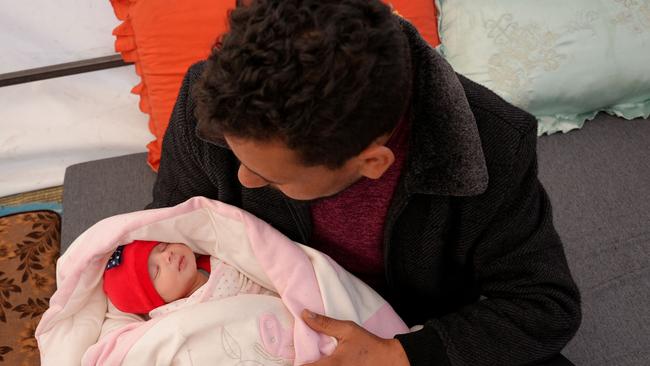
“The day they (the hospital) told us we could have her I was overjoyed, it was indescribable.”
The father, who shares six children with his wife, Hala, said his newborn niece has kept alive the memory of their deceased relatives, Afraa Mleihan, her husband, Abdallah, and their four other children.
“This child is a living memory of her father, mother and siblings,” he said.
“This girl means so much to us because there’s no one left of her family besides this baby. She’ll be a memory for me, for her aunt and for all of our relatives in the village of her mother and father.”
Mr Sawadi had been called to identify a dead woman, his wife’s cousin Afraa, when they discovered the newborn.
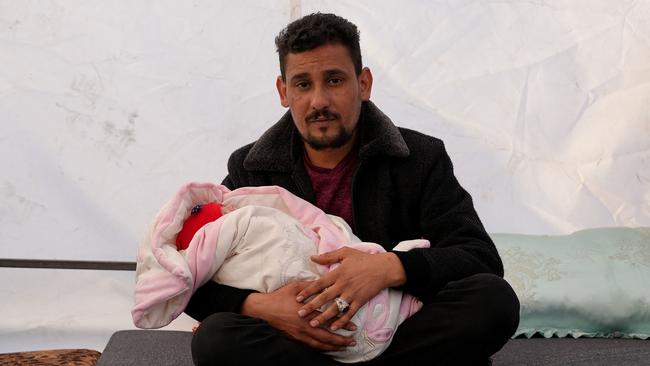
He said he took a razor from his pocket to cut the umbilical cord before handing the child to another cousin, who rushed her to the hospital.
While speaking with reporters, Mr Sawadi held Afraa wrapped in a pink blanket in one arm.
In his other arm, wrapped in a blue blanket, was his own newborn, Ataa, who was born three days after the earthquake.
AT LEAST SIX DEAD AFTER TURKEY HIT BY NEW QUAKE
At least six people died and hundreds more were left injured after a 6.4 magnitude earthquake Turkey’s southern province of Hatay on Monday - the hardest hit by a February 6 tremor which killed more than 41,000 in the country.
Around another 294 people were injured – 18 “seriously” in the latest deadly quake, the Turkish Emergency Coordination Center SAKOM said on Tuesday, adding that survivors were treated by health units in local hospitals.
Search and rescue operations in the affected regions are ongoing, the head of Turkey’s Disaster and Emergency Management Agency (AFAD), Yunus Sezer, tweeted.
Monday’s tremour hit the town of Defne at 8.04pm local time and was strongly felt in Antakya and Adana, 200km to the north. There are reports the tremor was also felt in Lebanon and Syria.
The disaster management agency said on Twitter another 5.8-magnitude tremor followed three minutes later and its epicentre was Samandag district in Hatay.
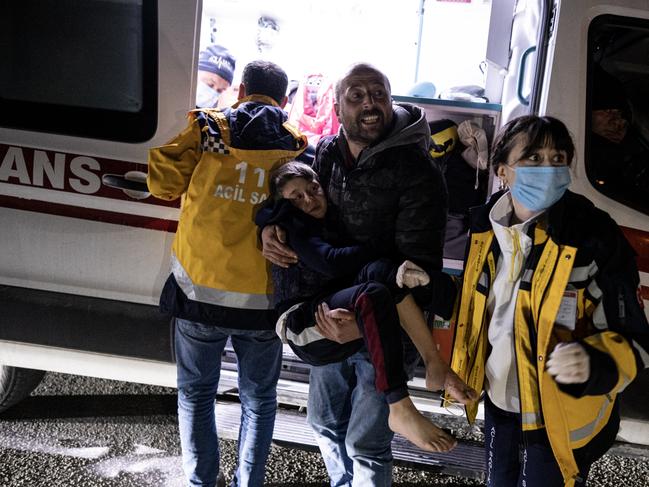
An AFP journalist reported scenes of panic in Antakya, adding that the new tremors raised clouds of dust in the devastated city.
The walls of badly damaged buildings crumbled while several people, apparently injured, called for help.
On a street in Antakya, Ali Mazlum, 18, told AFP: “We were with AFAD who were looking for the bodies of our family when the quake hit.
“You don’t know what to do … we grabbed each other and right in front of us, the walls started to fall. It felt like the earth was opening up to swallow us up.”
Mazlum, who has lived in Antakya for 12 years, was looking for the bodies of his sister and her family as well as his brother-in-law and his family.
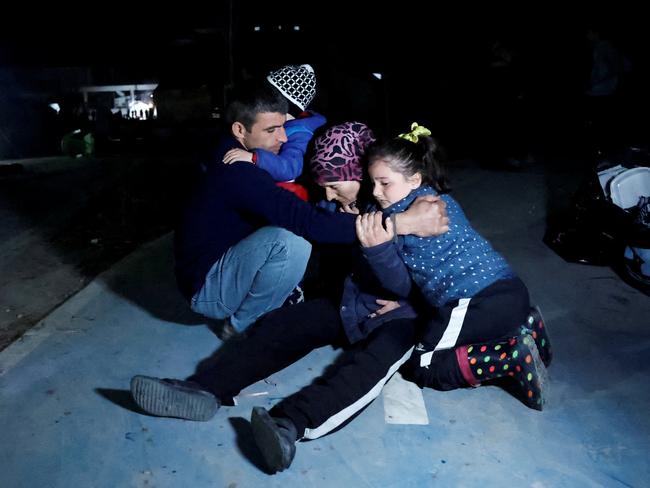
A few metres away, a digger was clearing a road was covered with rubble after the new quake.
Turkish Vice President Fuat Oktay on Twitter urged people to stay away from damaged buildings and to follow officials’ warnings.
According to AFAD, more than 6000 aftershocks have been recorded since the 7.8-magnitude hit Turkey and Syria, leaving millions homeless.
Officials said after the February 6 quake that aftershocks would be felt for a year because of the force of the first tremor.
AFP correspondents in the city of Aleppo, Syria’s second city, said people flocked to the streets after the new quake.
An AFP photographer in the city of Azaz, further north, said that of buildings that had been damaged in the previous quake collapsed.
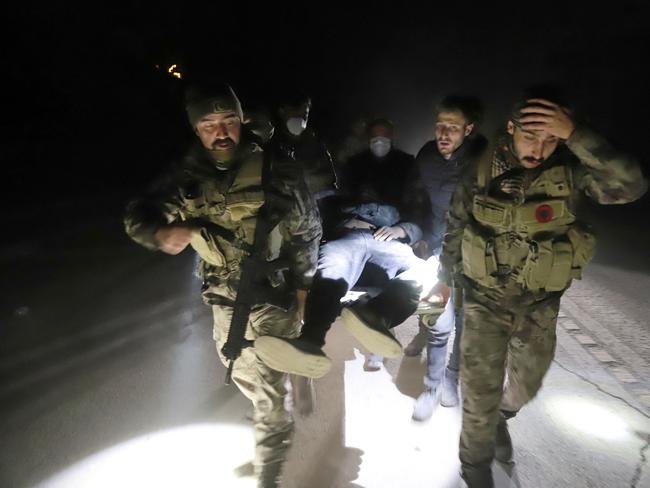
The February 6 earthquake killed 41,156 people in Turkey and 3,688 in Syria, but experts expect the toll to rise as the rubble is cleared and rescue operations come to an end.
Eleven provinces were hit by the previous tremors and on Sunday, officials said rescue operations continue only in two: Hatay and Kahramanmaras.
The quake two weeks ravaged swathes of southeastern Turkey and northern Syria, damaging more than 118,000 buildings.
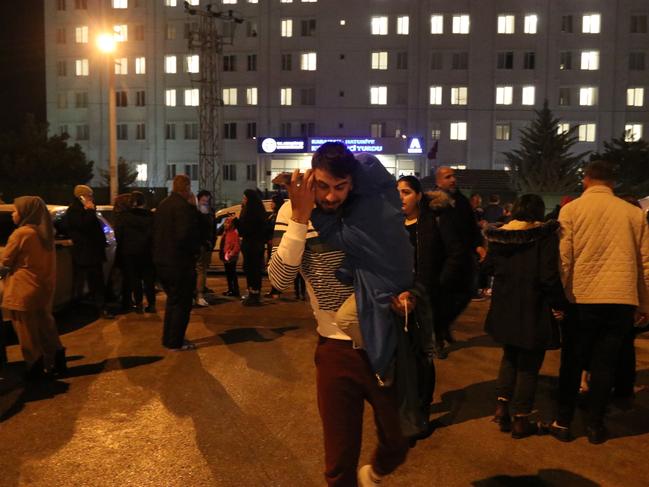
TURKISH LEADER VOWS TO BUILD 200,000 NEW HOMES
Turkish President Recep Tayyip Erdogan on Monday promised to build nearly 200,000 new homes within a year that were more sturdy and no more than four-storeys high.
“None of these buildings will be more than three or four storeys high,” he promised, after the quake caused several high-rise blocks of flats to collapse.
Experts say that while Turkey has the right regulations, construction companies often build homes of poor quality that are unable to withstand strong tremors.
“The buildings will be constructed … on sturdy ground and using the right methods,” Mr Erdogan vowed.
He said the new homes would be built away from fault lines, “closer to the mountains”, which would “protect against problems that are caused by soft soil”.
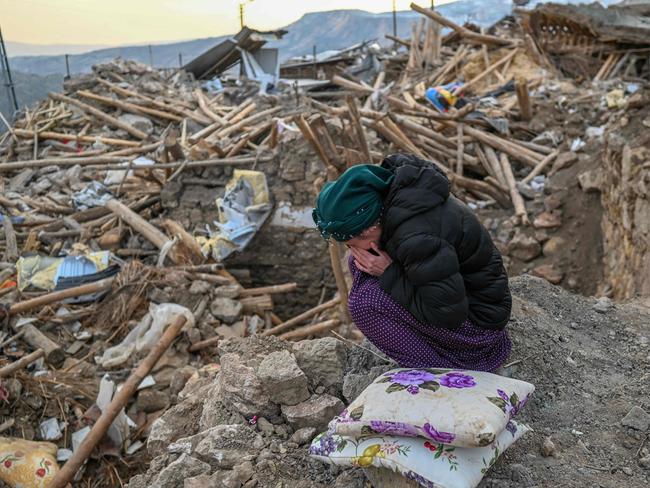
“We will start to move our citizens living in tents and container cities to their sturdy, safe and comfortable homes within a year,” Mr Erdogan added.
The state was providing shelter to around 1.6 million people in the region, the Turkish leader said after a visit to affected areas in Hatay province.
Mr Erdogan said rescuers had saved 114,834 people from the rubble. Search and rescue efforts have ended in nine provinces, but as of Sunday continued in Hatay and Kahramanmaras.
“We will build a new Antakya, Iskenderun, Arsuz,” the Turkish president said, referring to towns and cities in Hatay levelled by the quake.
The city of Antakya, once home to a myriad of civilisations, lies in ruins after the quake, with centuries-old mosques and churches destroyed.
SAUDI’S SEND AID TO SYRIA
Saudi Arabia hopes to send medical volunteers to areas of Syria rocked by the recent earthquake that killed thousands in the war-torn country, an official told AFP on Monday.
The kingdom severed ties with the regime of isolated Syrian President Bashar al-Assad in 2012.
But it has sent aid to both rebel-held and government-controlled parts of the country in the aftermath of the 7.8-magnitude tremor that struck southeastern Turkey and northern Syria on February 6, killing more than 45,000 people combined.
On Monday, the King Salman Humanitarian Aid and Relief Centre announced nearly $50 million ($A72 million) in additional relief to both Syria and Turkey.
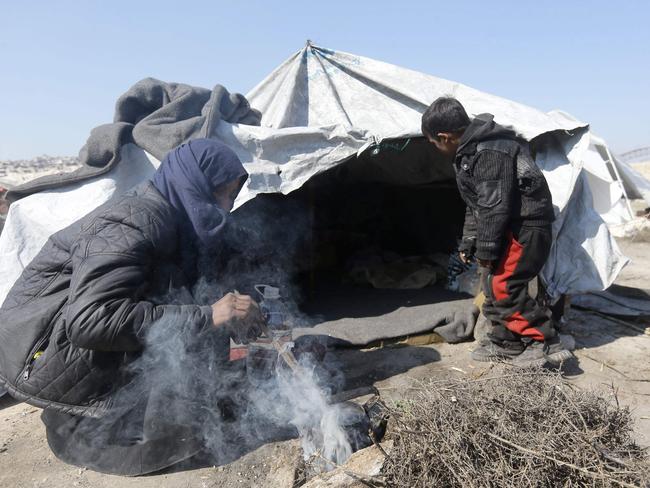
The new pledges, unveiled at the start of a two-day humanitarian forum in the Saudi capital, include a project that could send Saudi medical volunteers to Syria for the first time, said Dr Abdullah al-Rabeeah, the centre’s supervisor general.
“On the medical side, one of the projects we signed in the forum was related to actually the Syrian territories, because they are actually short of mobile clinics,” Rabeeah said.
“That’s the first phase, and we hope that we’ll see our Saudi volunteers on the ground.” Riyadh has so far avoided direct contact with the Assad government, co-ordinating instead with the Syrian Red Crescent on aid going into government-controlled territory.
Last week a Saudi plane carrying aid landed in Syria’s second city Aleppo – the first in more than a decade of war.
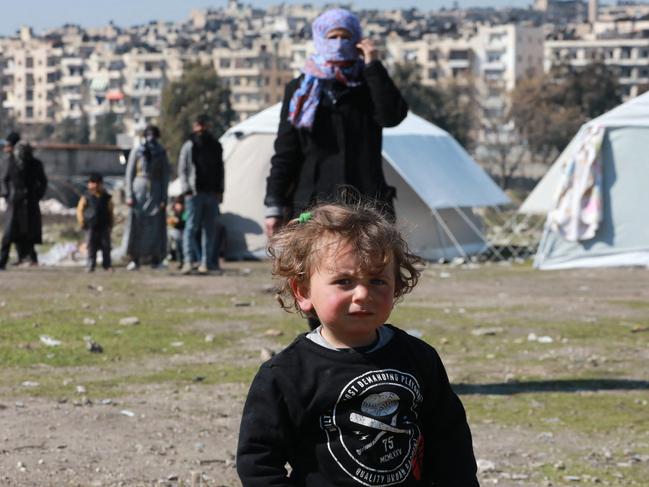
Saudi Arabia has sent 14 flights to Turkey and Syria so far.
Saudi Arabia’s foreign minister said on Saturday that a consensus was building in the Arab world that a new approach to Syria requiring negotiations with Damascus would be needed to address humanitarian crises including the quake.
“There is a consensus within the Arab world that the status quo is not working and that we need to find some other approach,” Prince Faisal bin Farhan told the Munich Security Conference.
A policy change could also help resolve the Syrian refugee crisis in Jordan and Lebanon, he said.
“That’s going to have go through a dialogue with the government of Damascus at some point, in a way that achieves at least the most important of the objectives,” including refugee returns, he said.
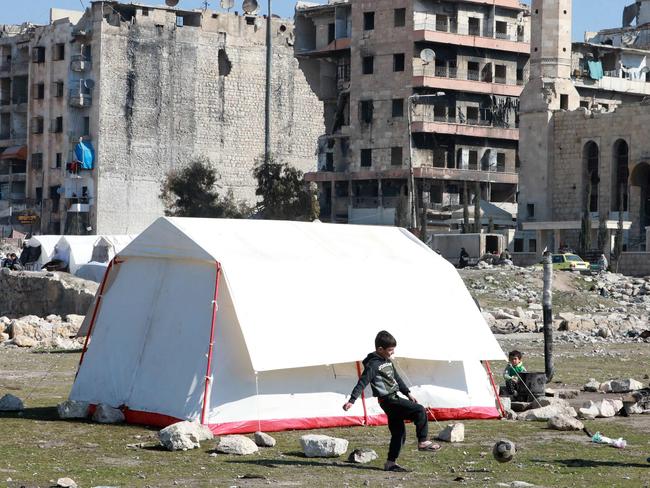
WORLD CUP STAR’S BODY FLOWN HOME
The body of former World Cup star Christian Atsu was being flown back to his native Ghana from Turkey on Sunday, the day after it was recovered from the rubble of the region’s monster quake, according to the New York Post.
“The Government of Ghana is making arrangements to receive the mortal remains of the late Christian Atsu, a former Black Stars player,” Ghana’s foreign ministry said in a statement on Sunday morning, local time.
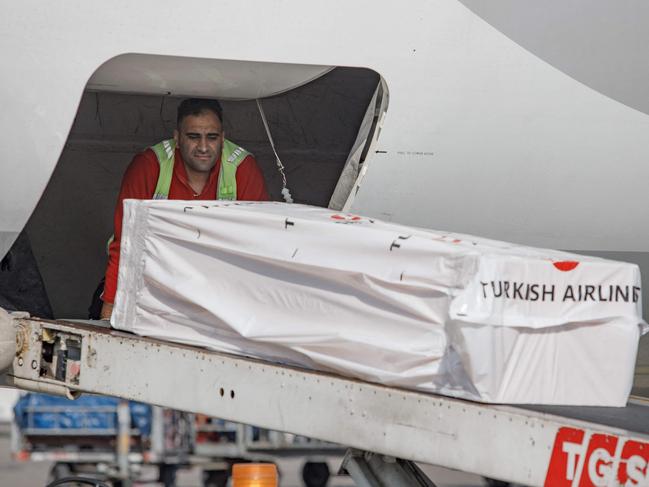
“The remains will be accompanied by his family and Ghana’s Ambassador to Turkiye on a Turkish airlines flight and will arrive in Accra.”
The 31-year-old married father of three went missing when the 7.8 magnitude earthquake struck Turkey and Syria early in the morning of February 6.
Atsu played for Hatayspor, a soccer team based in the Hatay province of Turkey, an area completely devastated by the earthquake.
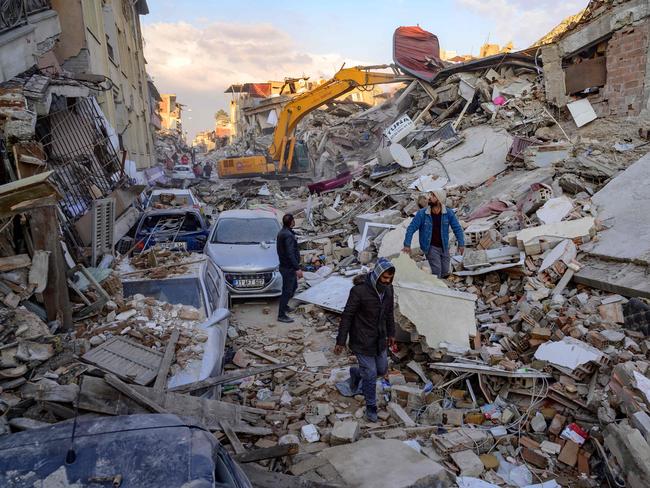
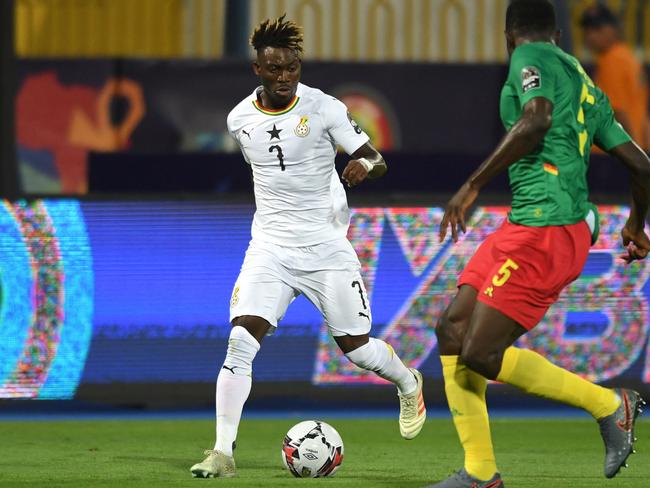
The soccer star had been set to fly out of southern Turkey just hours before the quake but chose to stay after he brought his team to victory in the final minute of a February 5 Super Lig match.
Soon after the quake struck, Hatayspor reported that the athlete had been “pulled out alive” from the rubble underneath his building. But tragically, a day later, it emerged that the player was still missing.
On Saturday, the ex-Chelsea winger’s Turkish agent, Murat Uzunmehmet, said, “Atsu’s lifeless body was found under the rubble.”
Turkey’s ministry said Atsu’s brother and sister were present when his body was recovered.
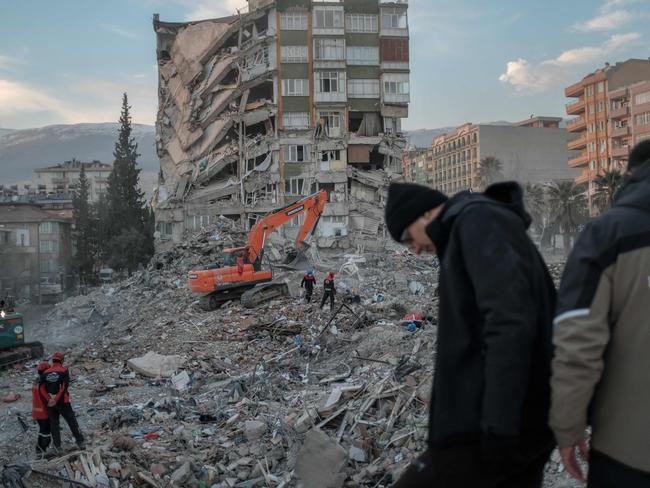
By Saturday, the death toll from the quake across Turkey and Syria had topped 46,000, as rescue workers began ceasing search operations while officials focused more on helping the region recover.
Atsu played for Chelsea in 2013 before brief stints at Everton and Bournemouth in the UK’s Premier League. He played for Ghana in the 2014 World Cup and won best player at the 2015 African Cup of Nations.
He joined Newcastle in 2016 and was part of the team during its promotion from the EFL Championship to the Premier League.
“We are profoundly saddened to learn that Christian Atsu has tragically lost his life in Turkey’s devastating earthquakes,” Newcastle tweeted Saturday.
“A talented player and a special person, he will always be fondly remembered by our players, staff, and supporters.”
Everton tweeted it was “deeply saddened” by the news, also.
“Our thoughts are with his family, friends, colleagues at @Hatayspor_FK, and everyone affected by this tragic event that has claimed so many lives,” the club said.
– with AFP



